- Home
- Steve Vernon
Sinking Deeper Page 6
Sinking Deeper Read online
Page 6
“Isn’t that usually where you get stamps?” I asked. “In the mail?”
“Very funny,” Warren said. “I can’t tell you how many nights I have spent sitting here at this table, peering at all of these wonderful stamps. Some nights I just sit here and dream about travelling to each of these different countries.”
“So why don’t you?”
“I don’t know,” he shrugged. “I’ve just never gotten around to it, I guess.”
I sipped my tea while Warren sorted through his stamps.
“Here,” he said. “These will do the trick.”
He laid down a block of four shiny Canadian stamps. One had a picture of a werewolf, and the others showed a giant squid, a gorilla, and a sea monster.
Wow.
“That’s the Loup-Garou and the Kraken,” Warren explained. “And that’s Bigfoot and Ogopogo.”
“I know Ogopogo,” I said. “I read about him on the Internet.”
“They’re all Canadian monsters,” Warren said.
“That’s really something,” I said. “They’re perfect.”
“Well, we only need a couple,” Warren said.
He carefully selected the Kraken and the Ogopogo stamps. He looked at Ogopogo carefully, as if he were considering something very important. Then he licked the werewolf and Bigfoot stamps and stuck them to the envelope.
“You keep these,” he said, handing me the Ogopogo and Kraken stamps.
I tried to give them back.
“You keep them,” he repeated. “All these years I’ve wasted dreaming. Now you come along and bring the stamps to life.”
He looked away. He swallowed hard, once or twice.
“I can learn something from you,” he told me.
“Me too,” I said, which was as profound as my fourteen years allowed me to be.
Chapter 14
Hide-and-Go-Moose
Fogopogo began to look a little better after Granddad Angus unearthed a nine-hundred-year-old moose hide from somewhere in the back of his garage. The moose hide stank like an old wet basement, and looked more than a little like a prehistoric, zombified, petrified, deep-fried mammoth, but when he laid it over the frame it looked pretty realistic.
“Where did you get this moose hide from?” I asked.
“From a moose, of course. He’d outgrown it. You might say he and his hide came to an unexpected parting of ways.”
“Is that the truth?” I asked.
“I’m saying it, aren’t I?”
Which didn’t help much, but that’s all he would tell me as we fastened the moose hide onto the frame. Afterwards, we used a glue gun to stick patches of aluminum foil and plastic wrap onto the moose hide.
“This will catch the light nicely and give it a whole fish-scale sort of look,” Granddad Angus explained.
He found some crow feathers that he had been saving in a dried-out paint tin and stitched them to the outside of the hide.
“How’s that look?” he asked.
“Like a bunch of black feathers stitched to a smelly old moose hide,” Warren said. “Are we fixing on building the world’s first flying moose?”
“The feathers will help to break up the silhouette. Just try and imagine seeing it from a distance on a dark and foggy night,” Granddad Angus said. “In the end it will look like exactly what people expect to see.”
I was more inclined to side with Warren, but I wasn’t going to say anything that might spoil the adventure. Even if it didn’t work, I was having fun putting this sea monster together.
“The moose hide won’t cover the oars,” I said. “People will be able to see them.”
“We aren’t using oars,” Granddad Angus said.
“What are we doing then? Swimming?” Dulsie asked.
“The great inventor has a master plan,” Warren said. “He won’t even tell me about it.”
Two days later, Granddad Angus showed us his secret plan.
“Propellers?” Warren said.
A propeller poked through a hole on each side of the dory. They were attached to a set of bike pedals in the centre of the boat. Granddad Angus sat in the dory with his feet on the pedals, and his hands holding on to a pair of handle grips that looked like they had come from a beat-up old bicycle.
My beat-up old bicycle.
“Is that my bicycle?” I asked.
“Well, it was. Now it’s something else,” Granddad Angus said.
“That was my bike.”
“You were figuring on riding that bike to Ottawa, were you?” Dulsie asked. “Or did you really think your mother would bother to haul your mementos there?”
Mementos?
It is awfully hard to listen to good sense, especially when it is coming to you from the mouth of a fifteen-year-old girl wearing a feather bonnet, with owl eyes painted around her own.
“Life is about letting go of things you no longer need,” Granddad Angus explained. “That’s how the trees make it through the winter—by letting go of the leaves they no longer need.”
Oh sure, I knew the bike was two years too small for me, but I still loved to sit on that purple glitter banana seat in our garage when it rained, reading through my comic book collection.
“They’re not propellers,” Granddad Angus said. “They’re called grinders. You turn the pedal and the grinder turns and moves the boat. They used them on dories that crossed Halifax Harbour back before the ferry boats ever ran.”
“Will they work?” Warren asked.
“Like a charm,” Granddad Angus said. “They’re slow but quiet. They won’t make much backsplash. From a distance it’ll look like the motion a sea monster would make.”
Warren and I nodded doubtfully.
“Besides,” Granddad Angus said, lifting a blanket up from the back of the dory, “I put something else in here from that old bike of yours.”
I leaned over, had a look, and grinned. Sitting in the stern of the dory, bolted to a sturdy board, was my extra-cushy purple glitter banana seat.
“All right,” I said with a grin. “That’s more like it.”
“We better cut some holes in the moose hide so we can see out of it,” Granddad Angus instructed. “And caulk up the seams good and tight. We don’t want to sink our sea serpent in the middle of the harbour, do we?”
In the midst of all this excitement I’d somehow forgotten that we planned on sailing this contraption on the open ocean. Thinking about the prospect of sinking made me want to paint and repaint and goop the dory with every kind of waterproofing imaginable.
Now that I thought about it, adding a few life preservers and a Coast Guard helicopter might be a good idea, too.
Chapter 15
A Bad Case of Stegosaurus Turnip Farts
The next day, Granddad Angus got us all up earlier than I liked. The crows were still snoring in the trees and a thick and cloying chowder-fog was brewing in the dark harbour.
“There’s work to be done,” he told me.
I watched as he used a needle that could easily have passed for a whale harpoon to stitch a tangle of yarn onto the dory monster’s neck to give it a thick red mane.
“Sea monsters have red manes?” Warren asked.
“It said so in Roland’s list of ingredients,” Granddad Angus said.
“I think it looks pretty,” Dulsie said, which was saying a lot considering she had painted a sunrise across her face. “It needs eyes, I think.”
“Right you are,” Granddad Angus said, reaching into his magic fishing vest of many pockets and pulling out two glittering chunks of light purple crystal.
“This is amethyst. The Mi’kmaq believed amethyst came to Nova Scotia after young Glooscap scattered his mother’s jewellery box across the beach.”
“Why would Glooscap do a thing like that?” I asked.
“Why?” Granddad Angus replied. “You might as well ask why oceans grow so deep.”
Which didn’t tell me much.
“It was probably because he was fourteen years old at the time,” Warren suggested. “In a recent Statistics Canada survey, it was proven that every single problem in the universe began with a fourteen-year-old boy.”
Dulsie swatted him for that. The swat didn’t stop him from giggling, or repeating what he said, or giggling some more, but I think Dulsie enjoyed swatting her dad all the same. As day-old-tea-bag boring as Warren could be sometimes, he sure made a pretty good father for Dulsie.
Granddad Angus glued the amethysts to the sides of Fogopogo’s head with a tube of something that smelled strong enough to get up and walk on its own.
“That looks great,” Dulsie said. “They glitter, just like a real sea monster’s eyes.”
“Oh yeah?” Warren asked. “So how many sea monsters have you seen, anyway?”
Dulsie stuck her tongue out at Warren.
“One final detail,” Granddad Angus said.
He showed us something that looked like a birch bark dunce’s cap.
“What’s that for?” I asked.
Granddad Angus barked into the narrow end of the cone in reply. It made a sound that reminded me of a mutated Labrador retriever.
“It’s a moose call,” Warren explained. “Hunters use them to call moose.”
“Do you think that sounds like a sea monster?”
“Well, what does a sea monster sound like?” Granddad Angus asked.
I had to admit that I had absolutely no idea.
“People believe what they hear,” Granddad Angus went on. “So we’re going to let them hear a sea monster.”
He made a horrifying haroomphing sound with the moose call. It sounded like a bloated stegosaurus with a bad case of turnip farts.
“It’s just going to take a bit of practise, is all,” Granddad Angus said.
He held the moose call and produced another turnip fart, even stinkier sounding than the last blast.
“Better keep practising,” I told him.
Granddad Angus shook his head.
“We’re all done with practising,” he said. “I think it’s time we took our sea monster out for a spin.”
Everybody suddenly shut up, the same way that a class full of kids goes silent when a teacher walks into the room. It was one thing to build a sea monster. It was quite another thing to actually sail it on the open sea.
“You really want to take this thing out into the harbour?”
“It’s not a thing. It’s got a name now. Everybody calls it Fogopogo,” Granddad Angus said. “And we’re taking Fogopogo out for a dip in Deeper Harbour.”
“And how will we get it into the harbour?” Warren asked.
“Simple,” Granddad Angus said. “We’ll take it out through Muddy Lake.”
I swallowed and took a deep breath, enjoying what I was sure would be one of my last.
Chapter 16
Muddy Lake Manoeuvres
Nobody in Deeper Harbour really knows just how deep Muddy Lake is, but it’s a fair bet that the bottom is awfully close to forever. The lake sits about half a mile out of town and feeds into the ocean just outside of the harbour through a winding stream we call the Drain.
There is a story passed around of a skidoo accident that happened many years ago. It seems a group of Scouts were on an ice-fishing trip. They were scooting across the ice when it cracked open, sending all three of the skidoos to the bottom of the lake. My dad says that it’s nothing but an old story that people tell to scare kids away from the thin ice—only Granddad Angus said differently.
“It’s a sad, true story,” Granddad Angus told me. “The ice opened up like a giant mouth, swallowed them up, and turned them into ice cubes.”
True or not, the story is soaked indelibly into the soggy annals of Deeper Harbour history. Kids around here say you can still hear the ghosts of those Scouts howling like wolves and reciting their Cub Scout promises on lonely, full-moon nights.
“Ice is funny that way,” Granddad Angus said. “You can look at it and it looks fine, but underneath the surface the rot has set in. The water, deep and warm, eats away at the strength of the ice. Things change, even if you can’t see it happening.”
And that spot on Muddy Lake was exactly where Granddad Angus wanted to test Fogopogo.
Warren backed his old station wagon, towing a gigantic wooden boat trailer, up to the boat shed. We loaded Fogopogo onto the trailer and covered it up with an industrial-sized tarp held down with some bungee cords and a whole lot of duct tape.
We drove away before the sun came up. I had told Mom that Granddad Angus was taking me fishing. I was getting pretty good at telling lies. I felt bad about that, but Granddad Angus always says that a storyteller needs to be a pretty good liar. Besides, it was nice to be good at something.
“This fog gets any thicker,” Warren fussed, “and I’m apt to drive us into the water, dory and all.”
“The fog is what we want,” Granddad Angus said. “It’ll add to the air of illusion. That’s why I picked today for the monster test launch.”
“Should I go down Main Street?” Warren wanted to know.
“How else are we going to get out of town?” Granddad Angus replied. “Besides, this is Deeper Harbour. Seeing a trailer rolling down Main Street with a boat-sized, tarpaulin-wrapped shape on the back is not going to make anyone raise an eyebrow.”
As we rolled down Main Street and past the police station, I thought I saw Dad waving at us. Or maybe I just imagined I saw him. As we got to the end of the street, I looked back. I still thought I could see Dad standing there in front of the police station, waving goodbye to a son running away from home in an old station wagon pulling an ark-sized boat trailer covered in duct tape and plastic. He receded into a dot in the distance, we hit one more bump, and then he was gone.
“What are you looking at?” Granddad Angus asked.
“Nothing,” I said.
When we arrived at the shore, the fog was so thick you couldn’t see more than ten feet in front of you.
Lowering Fogopogo into Muddy Lake should have been easy. I mean, we had gravity on our side, but it was tougher than I had figured.
“I’d feel safer if it wasn’t so close to duck-hunting season,” Warren said.
“Most of the hunters around here can’t aim worth spit,” Dulsie said.
“You better hope so,” Warren told her. “What’s with that getup of yours?”
Dulsie was dressed all in blue and green with a halo of goose down and the tracing of fish scales across her face and a magnificent sea serpent painted across her neck, up the sides of her face, over her eyebrows, and down the other shoulder. I wasn’t sure if she was a bird or fish. The truth was, I wasn’t sure if she knew just what she was supposed to be.
“We’re fine,” Granddad Angus assured us. “Duck-hunting season is weeks away.”
“All the same, I’d feel better if this hunting shirt of mine was bulletproof,” Warren said.
“Stop your worrying,” Granddad Angus told him. “Even if there are any hunters out here bold enough to shoot at a full-grown sea monster, they would most likely miss.”
“Maybe so,” Warren said. “But I still feel as if I’ve got ‘mallard’ written all over my backside.”
“Then make like a mallard and duck,” I suggested.
Everyone laughed, even Warren.
Then Warren tilted the trailer back and Granddad Angus took hold of his pry bar and me and Dulsie grabbed up a pair of two-by-fours and levered Fogopogo down into the water. The dory monster rolled going down and nearly crushed me against a nearby poplar tree.
“Hang on, Roland,” Granddad Angus shouted.
Easy for him to say. He
wasn’t the one trapped between a tree and Fogopogo. All I smelled was the reek of worked-in mud, lake moss, and prehistoric moose hide. I breathed shallow and slow, trying not to stare directly into Fogopogo’s dark amethyst eyes.
I could swallow you up whole was what those eyes were saying to me.
You bet was what I was thinking.
I tried to stay just as calm as I could while Granddad Angus, Warren, and Dulsie pushed Fogopogo clear. The dory monster slid into the water of Muddy Lake. It made a wet swallowing sound as it went, as if the water was somehow digesting the nine-hundred-year-old moose hide.
“Climb in,” Warren shouted. “Before it drifts away on us.”
So we all dove into the cold, smelly water and clambered underneath the flap in the moose hide. It was darker than a belly full of midnight and twice as scary. I knew just what the dory monster looked like. I’d scraped its hide and smoothed its bones and mopped its guts with cheap red paint, yet something about the dark and the lake and the closeness scared the heck out of me.
At least the pedal-propellers worked fine. Warren worked one and I worked the other. It took more than a few minutes for the two of us to coordinate our efforts. If he turned his pedal too hard or too fast we would swerve in my direction, and if I turned my pedal-propeller too hard we’d spin towards Warren—either way we’d wind up going in circles. Finally, we got the beast going in the proper direction.
“It’s working,” I yelled excitedly.
“Let’s take her out a little further,” Granddad Angus said.
BLAM!!!
It happened just as we were heading out into the deeper water.
Somebody was shooting at us with a shotgun that thought it was a gi-freaking-gantic cannon. Prehistoric moose hide gave way to a blast of buckshot, fired by some eager hunter crouching on the shoreline. I ducked and Dulsie screamed…or it might have been the other way around.
BLAM!!!
Another shotgun blast.
Things were happening fast, but not fast enough for my liking.
“Full speed ahead,” I called out, cranking on my pedal-propeller just as hard as I could manage. Warren matched me, most of the time, and the old dory monster took off slowly, wallowing through the water like a cement speedboat.

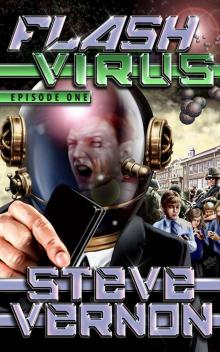 Flash Virus: Episode One
Flash Virus: Episode One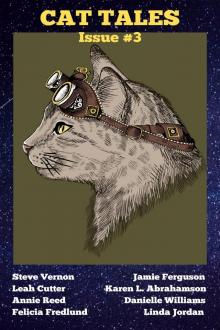 Cat Tales Issue #3
Cat Tales Issue #3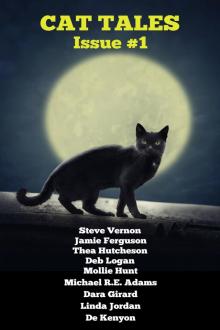 Cat Tales Issue #1
Cat Tales Issue #1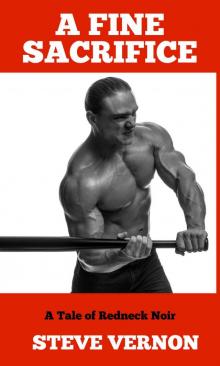 A Fine Sacrifice
A Fine Sacrifice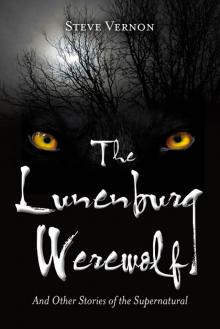 The Lunenburg Werewolf
The Lunenburg Werewolf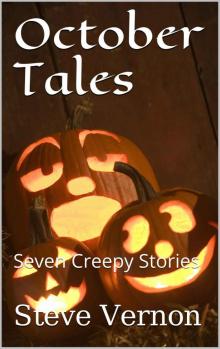 October Tales: Seven Creepy Stories (Stories to SERIOUSLY Creep You Out Book 1)
October Tales: Seven Creepy Stories (Stories to SERIOUSLY Creep You Out Book 1)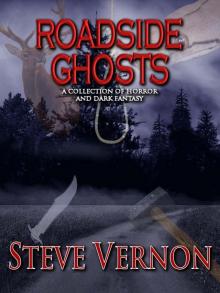 Roadside Ghosts: A Collection of Horror and Dark Fantasy (Stories to SERIOUSLY Creep You Out Book 3)
Roadside Ghosts: A Collection of Horror and Dark Fantasy (Stories to SERIOUSLY Creep You Out Book 3)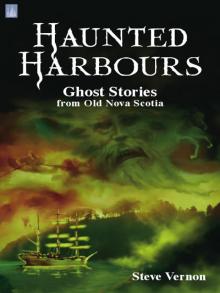 Haunted Harbours
Haunted Harbours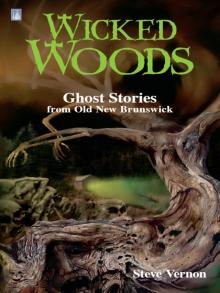 Wicked Woods
Wicked Woods Two Fisted Nasty: A Novella and Three Short Stories (Stories to SERIOUSLY Creep You Out Book 2)
Two Fisted Nasty: A Novella and Three Short Stories (Stories to SERIOUSLY Creep You Out Book 2)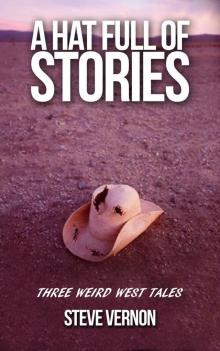 A Hat Full of Stories: Three Weird West Tales (Stories to SERIOUSLY Creep You Out Book 9)
A Hat Full of Stories: Three Weird West Tales (Stories to SERIOUSLY Creep You Out Book 9) Bad Valentines: three twisted love stories (Stories To SERIOUSLY Creep You Out Book 7)
Bad Valentines: three twisted love stories (Stories To SERIOUSLY Creep You Out Book 7)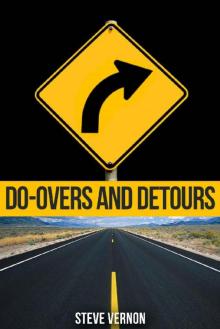 Do-Overs and Detours - Eighteen Eerie Tales (Stories to SERIOUSLY Creep You Out Book 4)
Do-Overs and Detours - Eighteen Eerie Tales (Stories to SERIOUSLY Creep You Out Book 4)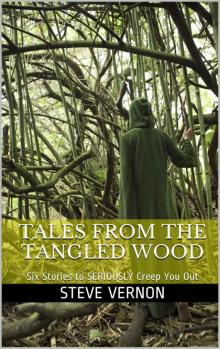 Tales From The Tangled Wood: Six Stories to SERIOUSLY Creep You Out
Tales From The Tangled Wood: Six Stories to SERIOUSLY Creep You Out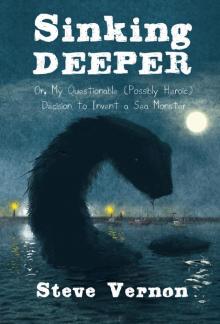 Sinking Deeper
Sinking Deeper Bad Valentines 2: Six Twisted Love Stories (Stories to SERIOUSLY Creep You Out Book 5)
Bad Valentines 2: Six Twisted Love Stories (Stories to SERIOUSLY Creep You Out Book 5)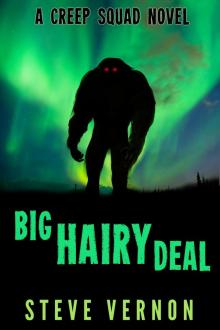 Big Hairy Deal
Big Hairy Deal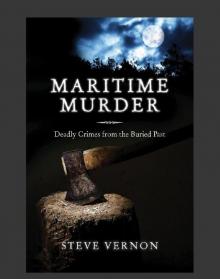 Maritime Murder
Maritime Murder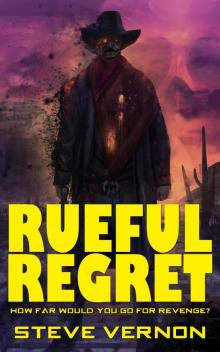 Rueful Regret
Rueful Regret